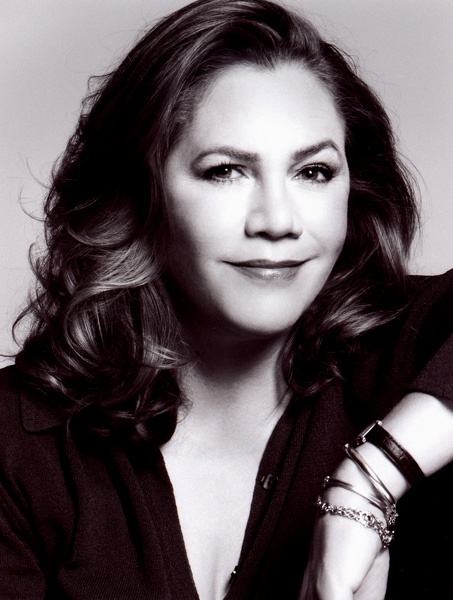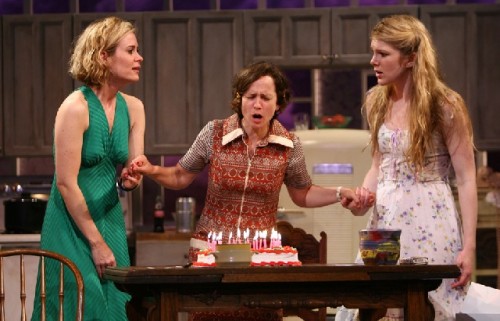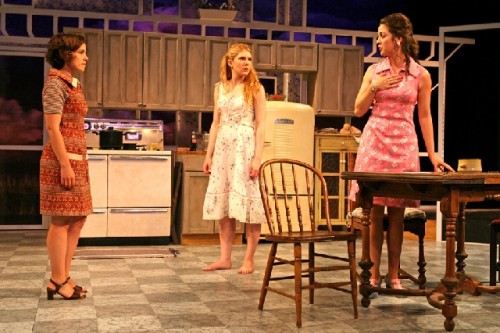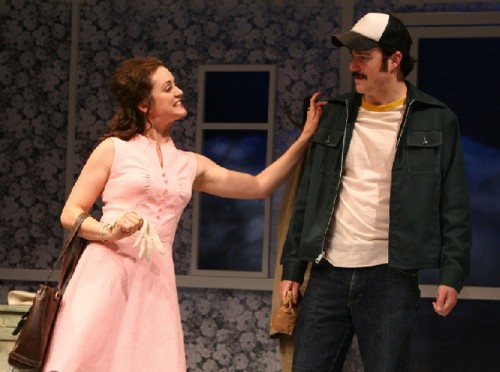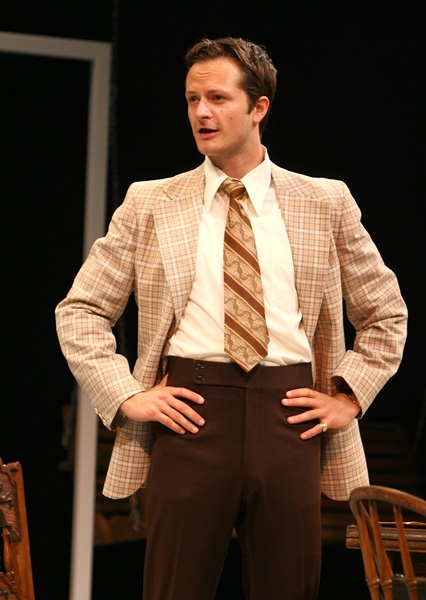Beth Henley's Crimes of the Heart at Williamstown Theatre Festival
Directorial Debut for Actress Kathleen Turner
By: Charles Giuliano - Aug 10, 2007
Crimes of the Heart
By Beth Henley (1979)
Director, Kathleen Turner; Sets, Kris Stone; Costumes, Christal Weatherly; Lights, Charles Foster; Sound, Drew Levy; Production stage manager, Adam Grosswirth; Production manager, Michael Wade; Casting, Laura Schutzel, Tara Rubin Casting.
Cast: (In order of appearance) Jennifer Dundas (Lenny Magrath), Kali Rocha (Chick Boyle), Patch Darragh (Doc Porter), Sarah Paulson (Meg Magrath), Lily Rabe (Babe Botrelle), Chandler Williams (Barnette Lloyd). Williamstown Theatre Festival, August 8-19.
http://www.wtfestival.org
While she aimed for the heart, Babe Botrelle(Lily Rabe) is telling her sister, Meg Magrath (Sarah Paulson), in the kitchen of the family home occupied by their spinster sister, Lenny, "I was so nervous that I shot him in the stomach." Her husband, an allegedly abusive brute, the richest man in their hometown, Hazelhurst, Mississippi, and state rep had apparently caught her in an affair with a young black boy aged fifteen. The affair has lasted for several years starting when they had a mutual interest in a stray dog named "Dog."
After attempting to kill her husband, in a key moment that is a metaphor for the entire 1979, Pulitzer Prize winning first play, Crimes of the Heart, by Beth Henley who grew up in Jackson Mississippi, Babe was so dry and thirsty that she burst into the kitchen and squoze up a heapin pitcher of leymmonnnade with no less than ten lemons and just tons and tons of sugar "Just like I like it." Having wet her whistle she went back to the living room where her husband was bleeding out. "Would you like a glass of lemonade" she asked seemingly oblivious to the fact that she just attempted to murder him. He gestured frantically that she should call for help. Later, relating all this to her attorney Barnette Lloyd (Chandler Williams), she wonders whether it will look bad to jurors that she made lemonade before calling for medical assistance.
Like those ever present pitchers of lemonade, the metaphor for this play and directorial debut by actress Kathleen Turner, is that this concoction of Southern Fried Chicken is as tart and sour as lemons served up way too sicky sweet in a family tragedy that is played for laughs.
Apparently, that was a winning combination back in 1980 when the play hit Broadway and won a ton of awards. It made me wonder to what extent it represents a time capsule and flash in the pan for a playwright who went on to a respectable career but nothing that ever matched or topped that initial success. She is quoted as stating that her decision to present family tragedy as comedy occurred when she doubled over laughing while attending an all black production of Chekov's The Cherry Orchard. The three Magrath sisters are loosely inspired by Chekov's Three Sisters.
It is one thing to present tragedy with a bit of irony and comic relief and quite another to devolve into broad farce as is the case here. There is a totally absurd moment when the sisters double over laughing, one literally falling to the floor in uncontrollable hysteria, while sharing the very funny news that the grandfather who brought them up after their mother hung herself, has lapsed into a coma with just hours to live. The audience was induced into nervous titters over that ridiculous situation.
As is always the case with the Williamstown Theatre Festival the cast was superb and worked their tails off trying to realize the vision of the esteemed actress Kathleen Turner in her directorial debut. The play got a great assist from a wonderful and witty set by Kris Stone. He created a latticed, flowered, translucent kitchen wall through which one sees a backdrop of big sky with a pattern of black and white clouds. It is a dream evoking set perhaps intended to bring us back to the mood of Old Miss in the late 1970s, just five years after Hurricane Camille, which had a devastating impact on the love affair between Meg and Doc Porter (Patch Darragh).
The costumes of Christal Weatherly were a hodge podge. In the second act Meg .who is supposed to be a sexy, former country and western singer, looks just awful in a ghastly green dress and clunky boots. On the other hand, the slick young country lawyer Barnette Lloyd was a perfect hick in vintage, high waisted, brown, polyester pants with a tan, plaid jacket. You could almost smell the cheap after shave lotion. Looking at the costumes of the other women were the fashions really that ghastly in rural America? In this case was bad supposed to be good as in like design decision and stuff?
While the actors did their best and have some fine moments the whole just doesn't add up in the overly shrill intensity and fast pace of Turner's flawed direction. She never allows us to absorb the information conveyed by the characters. We never feel connected to them with the singular exception of Lenny Magrath (Jennifer Dundas) who as an insecure and sensitive spinster is literally overshadowed by her more broadly drawn and farcical sisters. Lenny is arguably the only believable and sympathetic character in the play and she is presented with admirable restraint in a performance that vainly tries to find a center for all the mayhem swirling about her.
One of the initial attractions of this play was that it was site and time specific. The author who also had a starring role in the debut production brought an authentic sense of a uniquely small town, Southern, ambiance to Broadway. Here, however, we are truly burdened by a tedious evening of several women presenting a caricature of Southern accents and mannerisms. None of it rang true and was just so much phony baloney. I rather doubt whether any of the actors have spent so much as a minute in Old Miss. Insisting on those regional voices just burdened any genuine drama and structural integrity in this mishap of a production.
The initial impulse and intentions are all too obvious. On paper this may have looked like a winner. The directorial debut of a distinguished female actress of a certain age, presenting the award winning early work of a Southern female writer, in a play about the lives of three sisters. The males in this mix are little more than props and pot lickers. Darragh was just barely adequate as Doc, Meg's former love interest, while Chandler Williams deserves much praise for maintaining underplayed restraint in a minor role. He advances two plot elements. First, he wants vengeance on Babe's injured husband, and has a crush on his client having bought a cake from her some time earlier at a charitable event. So he has strong and successful motive for getting her off from a blatant crime.
In what is arguably the play's most ridiculous, of many, moments Babe assumes that all is lost when her husband produces evidence in the form of photographs of her making love to a minor black boy. That didn't play well to a jury in Old Miss at that time. It was an all too predictable and obvious bit of inept writing by Henley. It has Babe farcically running off to the attic to hang herself just like her Mom. Only to appear shortly later, rope dangling from her neck, To Answer the Phone. Huh? For this you win the Pulitzer Prize? Then Henley has Babe stick her head in the oven. Good grief. Only to be discovered by Meg hauling home a day late birthday cake for Lenny so they can have a happy ever after, warm and fuzzy, ending. Yahgaddahbekidding.
Another minor but superb role was Chick Boyle (Kali Rocha) as the prim and proper, mean spirited and nosy cousin. She absolutely looked and acted more small town authentic than any other member of the cast. The action came alive every time she appeared on stage. The opening scene of her putting on panty hose, legs spread, facing the audience for a peep show, was just side splitting. We craved more of that kind of comedy.
Mostly, I found myself wondering why I didn't give a fig about these women and their dilemmas. There was just nothing that connected me to them. Their world was a cartoon and there were no issues that conveyed a larger, more universal world view. In Chekov, to use Henley's stated source of inspiration, his plays may be set in late 19th century Russia, a time and place to which we have no direct connection, but he draws us in and makes us really care about his characters and their problems. His Three Sisters moves us deeply while Henley's little ditty leaves us with a tummy ache after all that treacle and layymonnnnaddde.
Again I wondered just what about the zeitgeist of 1979 induced her to write a play which was much praised then and now seems so dated. It is the very nature of art that time has a way of correcting and rebalancing the true order of things. As a control I looked up the Academy Awards for that year. The Best Picture award went to Kramer vs. Kramer. When was the last time you wanted to take another look at that one? The other nominees were All That Jazz, Breaking Away, Norma Rae, and Apocalypse Now. Time has shown that Apocalypse Now was a masterpiece and occupies a firm place in the canon of cinema. While Kramer vs. Kramer was, at best, like Crimes of the Heart, merely of the moment. That was also the year of Being There, another masterpiece, and the briefly polemical, The China Syndrome.
So there is a time and place for everything and everything in its place. But, for me, Crimes of the Heart, last night, was just the wrong time and the wrong place. Hopefully, Turner will get it right the next time.

